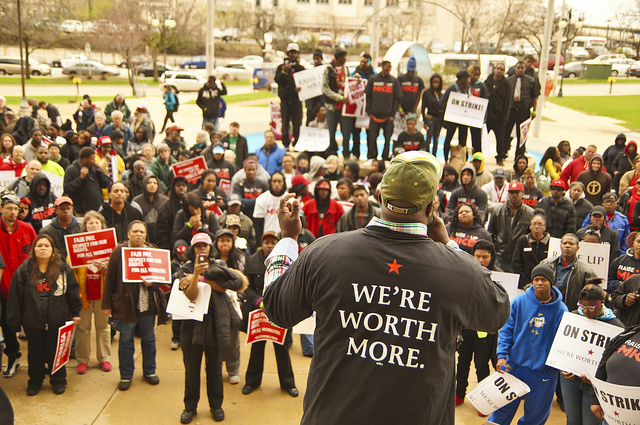Like this article? Chip in to keep stories likes these coming.
Saskatchewan public sector workers have won back the right to strike.
In a 5-2 majority, the Court deemed that the essential service law, which prevents public sector employees from striking, violates section 2(d) of the Charter of Rights and Freedoms, which protects freedom of association.
The Court has given Saskatchewan one year to enact new legislation.
Enacted in 2007, Saskatchewan’s Public Service Essential Services Act mirrors similar legislation in British Columbia, Nova Scotia and elsewhere, giving governments the authority to deem public sector services essential, thereby taking away the right to strike for workers in those sectors.
Though the Regina Court struck down the law as unconstitutional in 2012, the Saskatchewan Court of Appeal overturned the ruling a year later. Today’s ruling overturns that verdict in that appeal.
Speaking on behalf of the three high court judges who ruled in favour of the Saskatchewan Federation of Labour appeal, Justice Rosalie Abella said that:
“the right to strike is not merely derivative of collective bargaining, it is an indispensable component of that right. Where good faith negotiations break down, the ability to engage in the collective withdrawal of services is a necessary component of the process through which workers can continue to participate meaningfully in the pursuit of their collective workplace goals. This crucial role in collective bargaining is why the right to strike is constitutionally protected by s. 2 (d)”
“I think the Court should be applauded for their decision to recognize that the right to strike is a fundamental right protected by our Charter,” said Canadian Labour Congress (CLC) President Hassan Yussuff. “I think this is an absolutely great decision in regards to the context of collective bargaining.”
The decision is a further recognition of Canada’s international obligations under Internal Labour Organization (ILO) convention to uphold these rights, added Yussuff.
“The Court has said that governments who use their unilateral power to take away public sector workers’ right to go on strike can’t simply do that in an arbitrary way,” said Yussuff, “they have to be balanced in regard to when essential services exist. More importantly, it has to also lead to a process that would allow the workers to achieve fair collective agreements.”
Yussuff believes the decision also sends “a clear message” to the federal government, who, in recent years has also used essential service legislations to end labour disputes. “Those changes were quite draconian,” said Yussuff, “and now I think the federal government is going to have to rethink its position — if it’s wise, rather than simply allowing that to play out through another Supreme Court Challenge.”
The decision will also have resonance in the private sector, said Yussuff, where both federal and provincial governments are able to intervene in labour disputes.
“I think government is going to have to take some care when it decides to intervene in those disputes,” said Yussuff, “because on every one of those fronts these are fundamental recognitions by the court of the right to strike.”
Today’s decision is the second Supreme Court ruling this month to enshrine labour rights under Section 2.d of the Charter. On January 16, the high court struck down a law that prohibited the Royal Canadian Mounted Police from forming a union. In a 6-1 decision, the Court ruled that excluding Mounties from the Public Labour Relations Act, constituted a violation of the RCMP’s freedom of association.
Though Yussuff thinks it is too soon to say for certain what the meaning of these rulings will be, he did acknowledge that both verdicts are significant victories for labour.
“What governments in power now have to contend with is that there are certain rights that workers in our country have that are constitutional rights. They are not simply rights that can be taken away by governments — because they are protected by the Charter,” said Yussuff.
“It is a benefit and strengthens our role as the labour movement in regard to: one, workers making a decision to join unions; and secondly, in collective bargaining; and more importantly should they decide to exercise their right to strike,” he added.
By invoking the Charter to protect labour rights the Courts have made a significant decision to see workers’ rights through the broader context of human rights, said Yussuff.
“The Courts have made it very clear through these decisions that these [rights] are fundamental in regard to workers negotiating with their employers for their economic benefit,” said Yussuff, “They are not simply separable as labour rights they are part of human rights protections that workers have in this country.”
Ella Bedard is rabble.ca’s labour intern. She has written about labour issues for Dominion.ca and the Halifax Media Co-op and is the co-producer of the radio documentary The Amelie: Canadian Refugee Policy and the Story of the 1987 Boat People.




